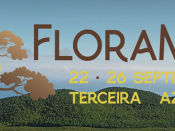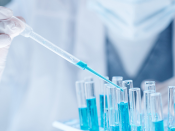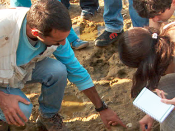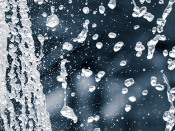Por Edwin J. Devid (Dutch Institute for Fundamental Energy Research - DIFFER).
Host: Paulo Martinho.
Atmospheric CO2 concentrations still continue to rise in 2020 [1] and are threatening the goals of the Paris Agreement [2]. By activating CO2 through plasma, CO2 is reduced into CO where CO is not only a high-value chemical for the chemical industry but also allow to store renewable electricity into chemical energy via an intermittent way at the cost of CO2 consumption. Currently, mere CO2 dissociation through non-thermal inductively coupled Radio Frequency (RF) plasma is not economically viable to obtain both high CO2 conversion and energy recovery efficiencies [3,4].
In this experiment, CO2 dissociation by plasma is assisted by the co-reactant carbon. Through this co-reactant, additional processes will take place that aids the CO2 dissociation into CO. In low vacuum (~1.3 mbar CO2), carbon is heated (till 1000 K, in a quartz tray) while being exposed to CO2 plasma. This process gives increased yields of CO where O2 gas is consumed by the dominating process: 2C + O2 –> 2 CO. No evidence of the gas phase back reaction CO + 1/2O2 –> CO2 is observed. By usage of isotopic carbon13 and modeling of the mass spectrometric data, the different processes operating (i.e. 2C + O2 –> 2 CO versus CO2 –> CO + 1/2O2 and CO2 + C –> 2 CO) are disentangled. Under a buildup ~1.3 mbar CO2 atmosphere plus combined plasma and heat exposure upon the carbon gives, with increasing temperature a steeply rising of emitted CO at the cost of declining O2 and CO2. From the isotopic carbon is determined that after plasma and heat exposure: the surface color, surface area and pore volume has been changed. In addition the sample mass is reduced (carbon consumption up to 36% gravimetrically), confirming that carbon is consumed.
This potentially opens a new way toward O2 removal during CO2 dissociation processes by combining plasma with heating of carbon to generate a clean CO2/CO stream. If the carbon is of a biogenic origin, the process as a whole is sustainable and fossil free CO is generated. Other additional processes that aid to further increase the CO yield (like reverse Boudouard reaction: CO2 + C –> 2 CO) help to find ways for industry to reach higher CO yields by both increasing the CO2 conversion and the consumption of O2 through the presence of carbon via non-thermal plasma.
References:
[1] IPCC, 2022: Climate Change 2022: Mitigation of Climate Change., P. R. Shukla et al.]. Cambridge University Press, Cambridge, UK and New York, NY, USA.
[2] C. Streck et al., Journal for European Environmental & Planning Law, (2016). 13. 3-29.
[3] R. Snoeckx and A. Bogaert, Chem. Soc. Rev., 46, (2017).
[4] Wolf, A. J. et al., The Journal of Physical Chemistry C, 124, 31, (2020), 16806-16819






